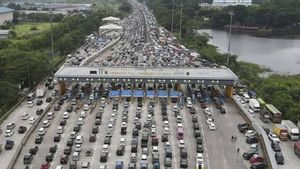JAKARTA - The film Bullet Train by director David Leitch takes a Japanese setting that is synonymous with the glow of neon lights and the strains of city pop songs that are famous in big cities like Tokyo. The film, starring Brad Pitt, depicts an intercity journey using bullet trains or high-speed trains from Tokyo to Kyoto.
The film focuses on Ladybug (Brad Pitt), a former professional killer who recently attended therapy, and returns to work with an optimistic and positive attitude than ever.
He is assigned by his manager, Maria Beetle, to complete a simple task: steal a bag inside the bullet train. Ladybug is initially reluctant, as she feels bad luck every time she gets a job.
Unbeknownst to Ladybug, it turns out that there are a number of other killers on the train, namely assassins Tangerine (Aaron Taylor-Johnson) and Lemon (Brian Tyree Henry).

Both have been assigned by The White Death (Michael Shannon), the head of the world's largest crime syndicate, which today has completely ruled Japan's criminal underworld.
In addition, there is also The Prince (Joey King) who traps Yuichi Kimura (Andrew Koji), to help him retrieve the bag and smooth out his covert plan. Kimura is the son of The Elder (Hiroyuki Sanada), a former member of the yakuza who used to rule in Japan.
There is also The Wolf (Bad Bunny) who is looking for the perpetrators and taking revenge for the death of his wife and the entire cartel. And there is also The Hornet (Zazie Beetz), an assassin who is good at using poison.
The assassins are trying to get to the mysterious bag, while figuring out who and what made them end up fighting for their lives on the fast train.

Bullet Train is a film based on the novel Maria Beetle (2010) by Kōtarō Isaka. Instead of taking the same protagonist from the work, director David Leitch and screenwriter Zak Olkewicz took a different spin.
In the novel, the main character is Yuichi Kimura, while in the film, it is Ladybug. In addition, all the characters in the novel are Japanese, while in the film, the only Japanese characters are Kimura and The Elder.
This decision will certainly make choices and storylines with the novel to be different. However, this is not a meaningful thing, considering the audience is taken on a journey that is no less thrilling.
Set almost entirely in a series of bullet train carriages, the director and scriptwriter must be good at arranging scenes so that this adventure is not boring for the audience.

Leitch, who is known for works such as "Atomic Blonde" (2017), "Deadpool 2" (2018), and "Hobbs & Shaw" (2019), still seems to use the same formula for "Bullet Train", namely the action mix. with elements of "violence" that are quite brutal but wrapped in a touch of humor that makes the audience surprised and entertained at the same time.
Leitch's efforts to unite brutal action, humor, and touching drama are arguably quite successful. There are several scenes and dialogues that occasionally stir feelings. However, the duration of the film for 2 hours does not seem to be able to explain the background and motives of this series of characters in depth.
However, the actors who play the main characters in this film are able to have their spotlight. One that cannot be forgotten is the duo Taylor-Johnson and Henry, who play Tangerine and Lemon, respectively.

Like in the novels, Lemon loves the animated series "Thomas the Tank Engine". His great obsession with animation about trains causes stomach-churning behavior and jokes. Coupled with the dynamics and action with Tangerine, it makes this duo so refreshing and easy to enjoy -- just like a glass of orange ice and lemonade.
What about Pitt? Yes, of course, Pitt's action as a hitman who tries to face his dark world with positive thoughts, becomes a new trope that is different and comedic. However, Pitt's action, which carries out various stunts scenes himself, is also a plus for this film.
Another interesting thing about "Bullet Train" is the mix of English and Japanese that can be found throughout the film. Apart from emphasizing the setting, various terms, dialogues, pop culture (pop culture), and embedded kanji also add interesting insights for the audience, especially those who are already familiar with Japan.

One of them is the choice of the word "Dangan Ressha" instead of "Shinkansen" which is more commonly known to the public as "bullet train" or fast train. It turns out that, despite having the same meaning in English, "Dangan Ressha" and "Shinkansen" have differences in Japanese.
If you look at its history, Dangan Ressha appears earlier than the Shinkansen. Furthermore, if interpreted one by one from the kanji letters, "Dangan Ressha" literally means "Spherical Bullet Train" or "Bullet Train", while "Shinkansen" means "New Main Line", but because it was built with technology to travel at speed high, eventually he also became the vocabulary for "Bullet Train".
There are many terms and other Japanese pop culture that can be explored throughout this film, and it is definitely fun to learn unique things through a film.
Overall, "Bullet Train" can be a light, exciting, but also stressful movie choice! Keep in mind that this film is suitable for those aged 17 and over to watch. Quoted from ANTARA, Bullet Train will premiere in Indonesian cinemas starting Wednesday, August 10.
The English, Chinese, Japanese, Arabic, and French versions are automatically generated by the AI. So there may still be inaccuracies in translating, please always see Indonesian as our main language. (system supported by DigitalSiber.id)













